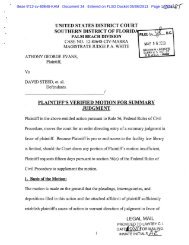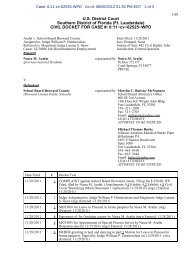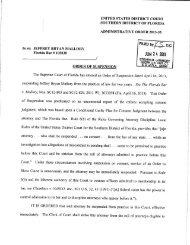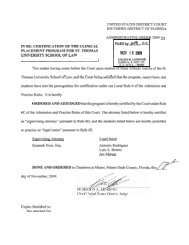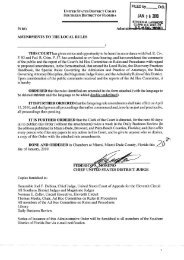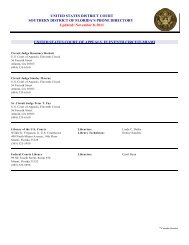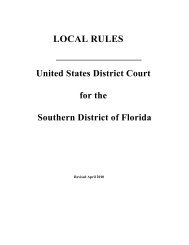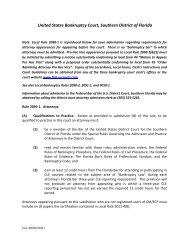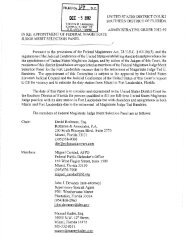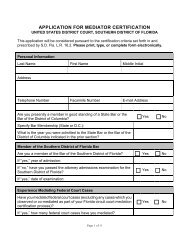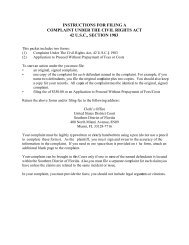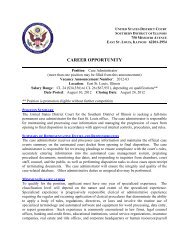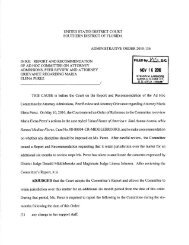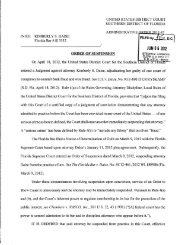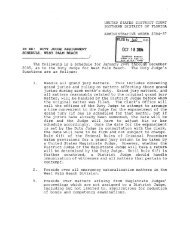US District Court Southern District of Florida (Miami) - United States ...
US District Court Southern District of Florida (Miami) - United States ...
US District Court Southern District of Florida (Miami) - United States ...
You also want an ePaper? Increase the reach of your titles
YUMPU automatically turns print PDFs into web optimized ePapers that Google loves.
Case 1:09-cv-22905-JAL Document 56 Entered on FLSD Docket 04/21/2011 Page 9 <strong>of</strong> 15<br />
9<br />
Stringer v. Jackson, et al.<br />
Case No. 09-22905-Civ-Lenard/White<br />
purported refusals were ―alleged deprivations . . . <strong>of</strong> a minor and short-lived nature [that] do not<br />
implicate general policies,‖ and held that ―policy and the prevailing state <strong>of</strong> the law require an<br />
inmate to articulate facts indicating some prejudice such as being unable to do timely research on<br />
a legal problem or being procedurally or substantively disadvantaged in the prosecution <strong>of</strong> a<br />
cause <strong>of</strong> action.‖ Id. at 1063. The instant case is identical to Chandler in that the Plaintiff has<br />
similarly alleged a minor deprivation consisting <strong>of</strong> Defendants‘ purported refusal to provide legal<br />
materials and supplies, but has failed to articulate or specifically demonstrate how he was<br />
harmed and prejudiced with respect to the different cases cited in his Complaint. Plaintiff‘s<br />
failure to allege how Jackson or Harris impeded his ―pursuit <strong>of</strong> a nonfrivolous, post-conviction<br />
claim or civil rights action‖ mandates dismissal <strong>of</strong> his access-to-courts claim, and Jackson and<br />
Harris are both entitled to qualified immunity. Wilson, 163 F.3d at 1291 (citing Bass, 143 F.3d<br />
at 1445).<br />
3. Plaintiff Fails to State a Section 1983 Claim for Retaliation.<br />
Ins<strong>of</strong>ar as Plaintiff is attempting to bring a retaliation claim under section 1983, that<br />
claim fails as well. With respect to prisoners‘ claims <strong>of</strong> retaliation, ―it has . . . been recognized<br />
that courts should approach prisoner claims <strong>of</strong> retaliation with skepticism and particular care due<br />
to the near inevitability that prisoners will take exception with the decisions <strong>of</strong> prison <strong>of</strong>ficials<br />
and because claims <strong>of</strong> retaliation are easily fabricated.‖ Thomas v. Pichardo, No. 08-22333,<br />
2010 WL 3119623, at *12 (S.D. Fla. June 2, 2010) (internal quotations omitted). In order to<br />
state a claim for retaliation under section 1983, a plaintiff must allege three elements: (1) that his<br />
speech or act was constitutionally protected; (2) that the defendant‘s retaliatory conduct<br />
adversely affected the protected speech or act; and (3) that there is a causal connection between<br />
the retaliatory actions and the adverse effect. Bennett v. Hendrix, 423 F.3d 1247, 1250 (11th Cir.<br />
2005). Moreover, Plaintiff must plead facts indicating that he was subjected to some ―adverse<br />
effect‖ which must be more than a ―de minimis inconvenience‖ to the exercise <strong>of</strong> his First<br />
Amendment rights. Id. at 1252. The Eleventh Circuit has adopted an objective test as the<br />
standard for determining whether there has been an adverse effect. Id. at 1254. Under this<br />
analysis ―a plaintiff suffers adverse action if the defendant‘s allegedly retaliatory conduct would<br />
likely deter ‗a person <strong>of</strong> ordinary firmness‘ from the exercise <strong>of</strong> First Amendment rights.‖ Id.<br />
This test is applicable to prisoners‘ claims <strong>of</strong> retaliation. Id. at 1253, n.6.



